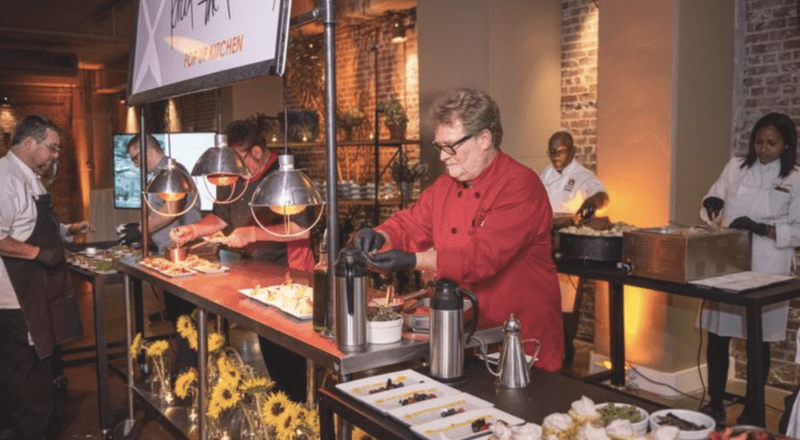
As president and owner of long-time Atlanta catering, event planning and food service company Proof of the Pudding, Adam Noyes knows that the dining portion of a meeting can make or break the event.

“Meetings can be lengthy and tiring depending on the subject matter,” Noyes said. “Having attendees active in their meal periods are wonderful opportunities for team-building and to bring energy and true experiences to the event.”
Noyes and his crew often make the dining portion of an event entertainment as well, with pop-up kitchens where chefs finish cooking and assemble the offerings in front of guests for each order. The company also has offered a pass-through wall where guests can peek into a two-sided chef-attended station to see chefs assembling and then passing through their small plates.
“We also offer Iron Chef kitchen-style competitions (where) we give each team a chef to pair up with for one hour to create their best three courses to present to the judges in true competition fashion,” Noyes said. “Having real chefs on the floor of the event can ensure we accommodate anyone’s dietary needs on the fly. This allows the guests to pick and choose exactly what they want. Offering gluten-free as well as vegan options in a chef-manned station will help with waste and serve up to guests what they desire.”
Shari Westmoreland, founder and managing director of The Eventors LLC, which specializes in event and meeting management, recently organized a food truck rally for a corporate client.

“It was a fun way to offer balance and choice with local food offerings for over 1,000 attendees,” Westmoreland said. “We were selective with the food trucks and items that each offered. Greek, Mexican, Japanese and barbecue were some of the trucks we brought in. We made sure some had salad and lighter offerings. A bonus was that they got to go outside and get fresh air too.”
Nourishing meeting attendees appropriately is extremely important to the overall meeting’s success and is often underestimated, Westmoreland said.
“What you eat during a meeting affects how you feel and how your brain can process information,” she said. “For an ideal meeting, it’s important to look at balance of food and beverage offerings, local flair and choices. With varied diets and allergies, working with the chefs at a venue is a priority.”
Offering variety and balance in the food itself and addressing special dietary restrictions also remains a key catering objective, according to Mary Cline, Wolfgang Puck Catering’s regional director of catering sales for the East Coast. Wolfgang Puck is the caterer for the Georgia Aquarium.

In Atlanta specifically, that means reinventing heavier Southern specialties to pay homage to local favorites, but lightening them up and balancing them with items of broader appeal, Cline said. “For instance, shrimp ‘n grits in smaller pre-portioned vessels with shredded collards presented as a salad with apple cider vinaigrette, pecans and pimento croutons.”
Cline, too, offers chef-attended stations as an entertaining option, particularly when paired with something like a pasta station at lunchtime — something guests might typically see at an evening reception but used at lunch instead of traditional buffets.
“Anything interactive that gives opportunities for guests to be the master of their own culinary destiny is more and more popular, from the old trail mix bars and candy stations to choosing their own fresh-pressed juice or curating their own bowl of fruit as a chef carves fruit live in front of them, offered with a mix of power grains, nuts, Greek yogurt, dried fruits, dark chocolate chips, (is) a great addition to breakfast, a morning break or afternoon break,” Cline said.
Meeting special dietary needs and requests can sometimes be costly so it’s important to ask about those needs up front. Once identified, planners should ask how these needs affect costs, said Natalie King, manager of event marketing for the Dynami Group event management and production agency.
“Knowing this information, you can plan-ahead for a cost-effective alternative versus ordering something they may not even eat,” King said. “The example that comes to mind here are kosher meals. They are so expensive to order separately and require advanced notice to order. Oftentimes when I’ve had a conversation with most kosher individuals, I’ve found they are fine with a vegetarian option, which is a significantly more cost-effective way to provide their meal versus a ordering a separate kosher meal.”
Clients also have an increasing focus on where food comes from, representing the “greening” of the meeting industry, according to Cline. Meeting these needs may include buying local and providing alternatives to plastics such as straws and beverage bottles — some of which carry a heftier price tag than the less-environmentally friendly ones.
“Solutions and options for many of these cares still come with additional costs — e.g., composting, using compostable materials, paying a premium for a local, hand-crafted product — but many are simple decisions and may seem small but on a larger scale have larger impact,” Cline said.
Options can include offering dispensed beverages alongside bottled beverages, removing straws, using paper products with no ink or adhesives (which makes them compostable and biodegradable), and upgrading disposable products from styrofoam or plastics to pressed bamboo or recycled materials, she noted. The ultimate benefit of utilizing local vendors is a better food and beverage experience overall, one that guests remember positively, Cline said.
Food Safety Tips For Meetings
Atlanta caterers and event planners share tips for keeping food safe at events:
Adam Noyes, president and owner, Proof of the Pudding:
“Food safety is always the top priority. All of our culinary staff is ServSafe (a National Restaurant Association food and beverage safety program) trained and we also have internal training and brand standards courses to ensure our employees have the education, tools and equipment to always serve fresh and quality ingredients.”
Natalie King, manager of event marketing, Dynami Group:
“Communication with the event and venue staff is key so everyone is aware of all dietary needs, can speak to exactly what is in each dish and even who these individuals are. Also, labeling is just as important. It’s best to be as inclusive of all ingredients that could be a restriction — ‘contains gluten, dairy,’ etc. — on your attendees’ lists, in addition to labeling items as vegetarian, vegan, etc.”
Shari Westmoreland, founder and managing director, The Eventors LLC:
“We require all foods to be labeled on buffets and menu cards presented for plated meals, and we communicate with the attendees who have special food and beverage needs. In addition, we will get the chef involved in the discussion to confirm an ingredient used.”
Mary Cline, Wolfgang Puck Catering’s regional director of catering sales for the East Coast:
“In situations where a guest has a serious, life-threatening food allergy, we recommend (and allow) the guest bring their own meal for safety purposes. Many of the requests that are asked of us are non-life-threatening and we are able to make minor modifications to either the preparation of a special meal, or modifications to an entire menu, without sacrificing quality, flavor, or the whole guest experience.”










